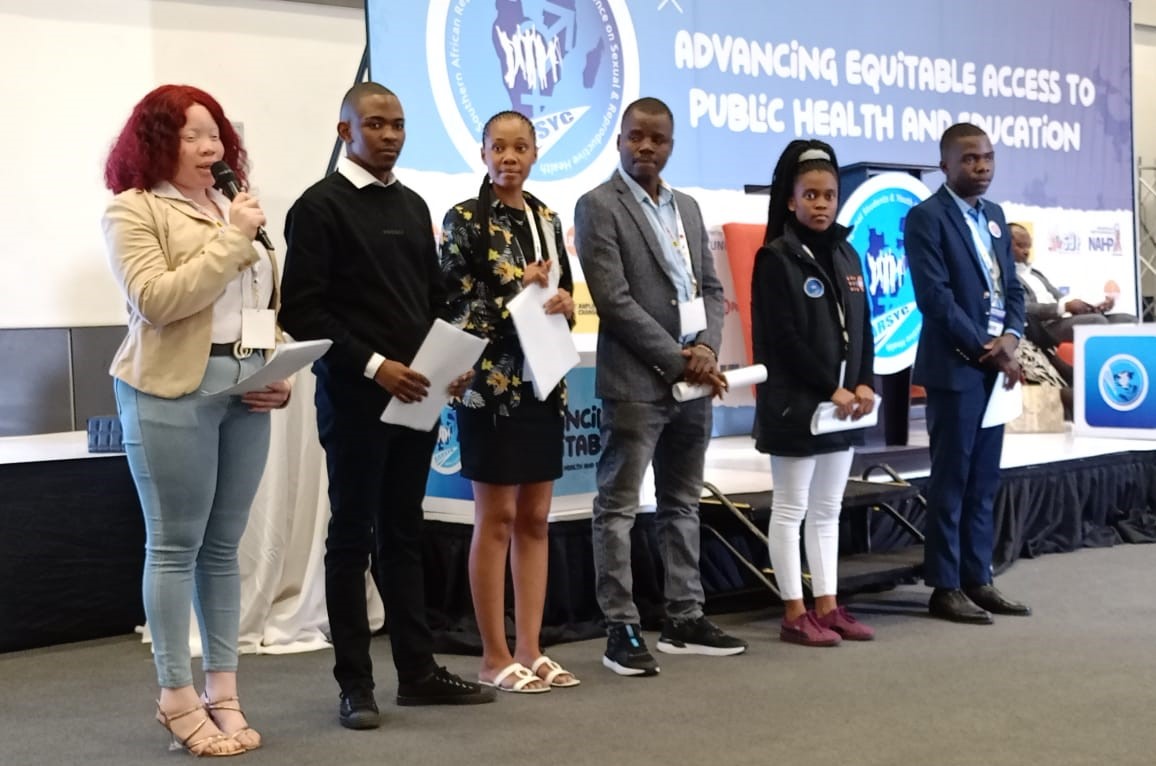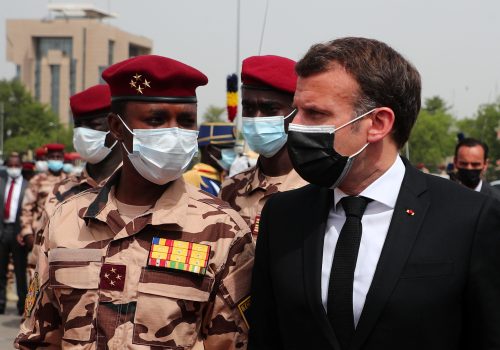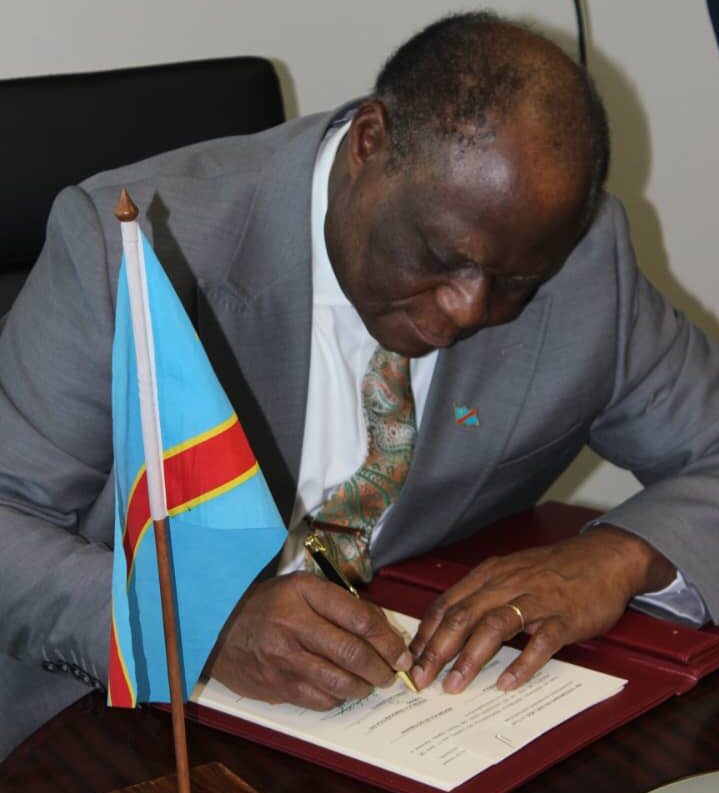
UNITED: Students from different SADC countries present a Declaration at the end of the fifth edition of the Southern African Regional Students and Youth Conference on Sexual and Reproductive Health (SARSYC V) in Gaborone, Botswana on Friday. Photo: Moses Magadza
SADC students’ conference ends with ‘Gaborone Declaration’
By Moses Magadza in Gaborone, Botswana
THE 5th edition of the Southern African Regional Students and Youth Conference on Sexual and Reproductive Health (SARSYC V) ended in Gaborone, Botswana on Friday, with the delegates challenging authorities to act on health issues affecting them.

In a communique dubbed the “Gaborone Declaration” that was adopted at the end of the three-day conference that ran from 17-19July 2024, the participants called on SADC Member States to take urgent action to reduce new HIV infections among young people and key populations through strengthened domestic funding and expansion of comprehensive, youth-friendly sexual and reproductive health services.
These include HIV testing, treatment, and the provision of prevention commodities such as condoms and Pre-exposure prophylaxis (or PrEP), medicine taken to prevent contracting HIV.
They called for meaningful inclusion of the voices and lived experiences of people with disabilities in all aspects of the tuberculosis (TB) response strategy, including actively consulting with disability rights organizations, empowering persons with disabilities to participate in decision-making processes, and making accessibility and inclusion core principles in TB strategies, guidelines, and service delivery models.
“Member states should fully implement and allocate adequate resources for the national and regional strategies, frameworks, and commitments related to HIV and TB prevention, care, and treatment,” they said in the Declaration.
They urged states to strengthen the integration of HIV and TB services, ensuring accessible and youth-friendly service delivery, particularly for marginalized and vulnerable communities.
The students asked development partners, civil society, and other stakeholders to expedite procurement processes and budgeting to achieve the goals of ending TB by 2030.
In this connection, they advocated removal of cumbersome bureaucratic processes in the procurement and supply of essential TB commodities, including diagnostics, medicines, and other health products.
Still on TB, the youths advised development partners to ensure screening, diagnosis, treatment, and care services are accessible to persons with disabilities as well as support the funding of TB programmes that are based on research including needs assessment for budget allocations to be responsive to the realistic needs of communities.
In line with UNESCO’s Education 2030 Framework for Action and the various programmes and interventions by SADC countries and their development partners, the SARSYC V requested SADC Member States to push for the continuation of education as a critical component of the Pact for the Future.
“Removal of Education from the successor framework to the Sustainable Development Goals (SDG 2030) is a threat to the future of young people,” the students warned.
They called for the allocation of at least 20% of the national budgets to education to ensure adequate, ring-fenced funding for targeted interventions to support marginalized learners in line with the Maputo Declaration.
The delegates advocated, also, for the removal of tax on all materials used to manufacture sanitary products to ensure these are affordable and accessible for the most vulnerable girls, particularly those in rural communities.
Recognisingthe importance of the International Conference on Population and Development (ICPD) Programme of Action in addressing youth health and wellbeing in Southern Africa, the delegates asked SADC states to accelerate the implementation of the ICPD commitments related to youth health and wellbeing.
“SADC states should institutionalise mechanisms for meaningful and inclusive youth participation and engagement in ICPD review processes and leverage on emerging technologies, such as artificial intelligence (AI), to strengthen public health and education systems in the region,” their Declaration said.
The youths challenged SADC states to invest in infrastructure development including affordable rehabilitation centres as part of the response to counter drug abuse.
“States must immediately establish a clear roadmap to address drug abuse as an urgent public health and socio-economic challenge that calls for a multi-sectoral and inter-disciplinary measures for it to be addressed,” they said.
They guided SADC member states to use social media and other platforms to raise awareness, advocate change, and mobilise youths to engage in climate action and SRHR initiatives as well as leverage on the AI revolution to develop sustainable solutions that address fundamental issues affecting young people.
A research indaba that took place during the conference provided a platform for young people to showcase research on issues affecting young people by young people.
In this context, the delegates enjoined development partners to invest in research to generate data and evidence that informs effective drug abuse response strategies and other priorities.
“Civil society organizations and donors should provide sustained support and resources to empower youth-led initiatives and networks that address the intersections of climate change, SRHR, and youth empowerment,” they said.
The youths called on states to dedicate resources to support community-centred research initiatives led by young people to address pressing issues such as juvenile delinquency, mental health, and other social determinants of sexual reproductive health (SRH).
Among other issues, the Gaborone Declaration exhorts policymakers to provide timely and meaningful feedback to young people on the submissions, recommendations, and solutions they propose through research and advocacy efforts.
“We ask for transparent mechanisms for policymakers to communicate with young researchers and advocates, acknowledging their contributions and outlining how their inputs have been incorporated into policy decisions,” they said.
On access to education, the Declaration calls for the removal of obstacles that prevent young people, especially those from marginalized communities, from fully leveraging their education to improve their lives and contribute to society.
“Policy makers must move beyond traditional quality education metrics like literacy rates and instead track the real-world utility and applicability of the skills acquired by young people through the existing education system,” the young people stated.
The students immediately handed the Gaborone Declaration over to SADC Parliamentary Forum Secretary General Ms Boemo Sekgoma for consideration and action by the region’s lawmakers.
In accepting it, Ms. Sekgoma told the students that the issues raised were “important and relevant.” She assured the conference that the SADC PF, which brings together fifteen (15) national parliaments of SADC and about 3700 Members of Parliament, would carefully consider the Declaration and act on it.
“I promise you that you will hear from us, and we will make sure that at the next committee session, we invite you or your representatives to come and table these matters yourselves,” she said to applause.
She said the SADC PF had researchers in at least ten national parliaments under a SIDA-funded SRHR, HIV and AIDS Governance Project that is dealing with a range of issues including the ones raised in the Declaration. She pledged the collaboration of the researchers and MPs.
Ms. Sekgoma encouraged the youth to embrace their national parliaments and work with and through them.
“We believe in parliaments. Parliaments can not survive without your voice,” she said.
The conference drew approximately two hundred (200) delegates from Angola, Botswana, DRC, Eswatini, Kenya, Lesotho, Liberia, Malawi, Mozambique, Namibia, South Africa, Zambia, and Zimbabwe.
(C) TPA2024








